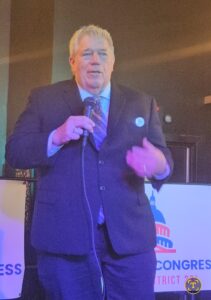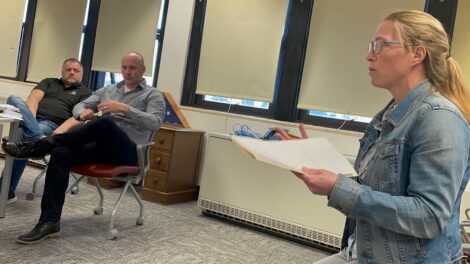Candidates Discuss Challenges In District 16
- John Davis
- Garrit Cain

John Davis
Two candidates are running for the Chautauqua County Legislature District 16 seat on Nov. 5.
The candidates include incumbent John Davis, who is running on the Republican, Conservative and Independence party lines, and Garrit Cain, who has been endorsed by the Libertarian Party. District 16 covers the towns of Poland, Carroll and Kiantone. The Post-Journal asked each candidate three questions on issues facing their district.
Question: Thoughts on the Carroll landfill litigation and how it has been handled up to this point?
Davis: First of all, I must clearly state for the record that I am personally 100% opposed to Sealand Corp., or any other entity for that matter, building a dump/landfill in the town of Carroll. It is clear that the majority of residents in the town of Carroll also oppose the landfill, as evidenced by the fact that in my two years representing this district, not one constituent has contacted me verbally, or in writing, to express support for it, while many have expressed their opposition. As such, I feel that the litigation has been handled as it should. The town board enacted a local law in 2007 known as the “Town of Carroll Waste Disposal Law.” The purpose of this law was and still is clear, “To restrict the operation of waste management facilities in the town of Carroll, and to exercise the right of the town under state law to protect the residents from such under Municipal Home Rule Law.” The litigation to this point has effectively supported the legality of this legislation, even though a company with deep pockets has made repeated attempts to overturn it.
Cain: The Sealand Landfill situation, windfarms, solar farms and potentially hydraulic fracking for natural gas are some of the challenges facing our county.

Garrit Cain
The fact that the New York Department of Environmental Conservation has enormous power in being the gate keeper in almost any proposed project in these industries mentioned above through the Environmental Impact Statement process is unfortunate and troubling. In short, not enough weight is put on input from the local (potentially impacted) citizens as well as a glaring lack of truly independent scientific study. That fact that the focus of litigation is now on the validity of local law should be a wake up call to other rural municipalities. Zoning and planning efforts should be less concerned about nitpicking small businesses and residents and laser focused on coming up with sound strategies and air tight legislation to meet the challenges of these types of projects when they are proposed in the future.
Question: From your point of view, what is your district’s biggest need?
Davis: Truthfully, I’m not convinced that the biggest need for the district is one that can be changed through legislation. There is undeniably a disproportionate lack of meaningful employment opportunities in District 16 when compared with the number of residents living here. The largest employer is a taxpayer funded (although excellent in my opinion) school system. While they seem to be centered around transportation hubs and city centers, District 16 could benefit from more meaningful, good paying jobs. People derive purpose, meaning, and income through employment, and I believe that it is the District’s greatest need.
Cain: Residential property taxes are crushing the people of our county and increasing the exodus of wealth and talent from our state. Blaming state mandates is becoming a worn out excuse to not cut wasteful county spending or find other ways to relieve residential property taxes. I recently outlined an aggressive plan that would involve locking assessments for half of the mortgage term on residential properties. This would require legislation at the state level and I think we need to encourage our state representatives to work on this. At the local level, there is already New York State Real Property Tax Law 421-f that allows for sliding scale assessment exemption for residential improvements, but it needs to adopted by individual municipalities. While not quite as strong as I’d like, as county legislator I would encourage passage, implementation and awareness of this policy in District 16, and throughout the county.
Question: According to a study done by Microsoft last year, 68 percent of residents in the county, mostly in rural areas, don’t have access to high-speed internet. What would you do as a county legislator to increase high-speed internet access for rural residents?
Davis: The issue of inadequate high-speed internet access for rural residents is troublesome in Chautauqua County. To that end, I have supported legislation to improve broadband access to portions of the county. Specifically, in March 2019, I voted in favor of resolution 97-19 to provide broadband internet access to an area of the county that was only receiving dial-up service. While I would like to see this process move even more quickly throughout the county, I am also accountable to my constituents to be fiscally responsible, so it is a problem that will take time to address.
Cain: I am a firm believer in the power of free markets. There is obviously a growing demand for high-speed internet in rural areas and eventually that demand will trigger movement in extending supply. The best thing local and county officials can do is make sure we are not hindering this type of market activity through regulation, litigation or excessive red tape. This ties in to my remark on local zoning and planning efforts. We should be proactive in anticipating the growth of this industry and come up with solutions that fit our towns, respect private property rights, and still provide for access and expansion of service.





